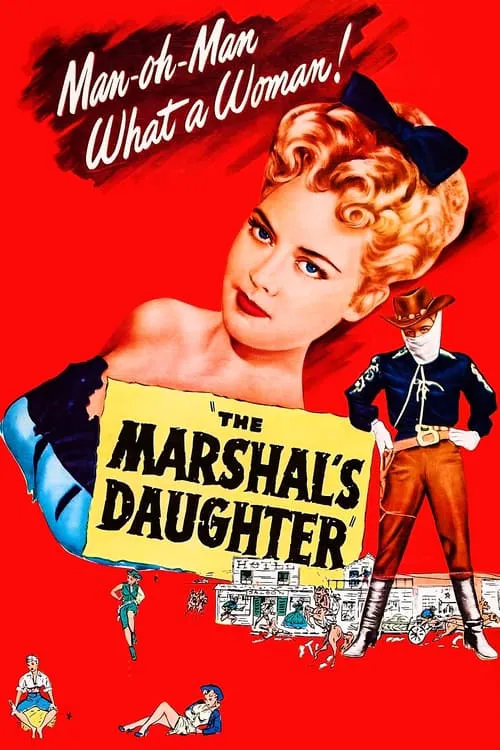The Marshal's Daughter

Plot
The Marshal's Daughter, a lighthearted western comedy, is a product of its time, showcasing the burgeoning fame of its lead actress, Laurie Anders. As a popular performer on The Ken Murray Show, Anders' charisma and catchphrase, "Ah love the wi-i-i-ide open spaces!" had captivated audiences, prompting Murray to capitalize on her popularity by producing this low-budget western. The story begins with Laurie Dawson, played by Anders, as a spirited and vivacious daughter of U.S. Marshal Dawson (Hoot Gibson). The marshal, a man of the law with a strong sense of duty, is tasked with apprehending notorious outlaw Trigger Gans (Bob Duncan). As Trigger's exploits pose a threat to the peaceful townspeople, Laurie decides to join forces with her father to bring the outlaw to justice. In her enthusiasm, Laurie devises a plan to disguise herself as a masked bandit, cleverly assuming the alias "The Black Widow." This decision allows her to infiltrate Trigger's gang and gather invaluable information that will aid her and her father in their pursuit. The character of Laurie Dawson is endearing and optimistic, exuding a sense of innocence and a yearning for adventure that is hard to resist. However, Laurie's efforts are not without their challenges. Trigger's gang is comprised of ruthless individuals, including a burly and menacing partner (played by Preston S. Foster) who poses a significant threat to Laurie's safety. Furthermore, her father's stern demeanor and old-fashioned ways often lead to humorous misunderstandings with her more carefree approach to solving the situation. The film also features an appearance by Preston S. Foster, a seasoned actor known for his versatility in various genres. As a rugged and formidable adversary, Foster's character forms an unlikely alliance with Trigger, adding an element of complexity to the story. The presence of Johnny Mack Brown, Jimmy Wakely, and Buddy Baer, who are depicted as themselves in an in-joke within the film, adds an additional layer of meta-humor. Throughout the movie, the viewer is treated to an abundance of corny jokes and cringe-worthy puns that, while intended to evoke humor, often come across as cheesy and contrived. Stock footage, culled from earlier westerns, is liberally used in this oater, further emphasizing its low-budget origins. In spite of its flaws, The Marshal's Daughter remains a nostalgic relic of a bygone era, one that evokes a sense of optimism and hope. The portrayal of Laurie Dawson as a fierce and determined heroine who refuses to be restricted by the social conventions of the time, resonates with viewers and makes her a memorable figure in Western cinema. Ultimately, The Marshal's Daughter, as a film, falls somewhere in the middle – a mix of genuine charm and obvious artificiality, tempered by its period-specific sensibilities and its attempt to leverage the popularity of its lead actress. However, its lighthearted tone and nostalgic appeal will likely resonate with audiences who revel in the retro appeal of these kinds of films.
Reviews
Recommendations



